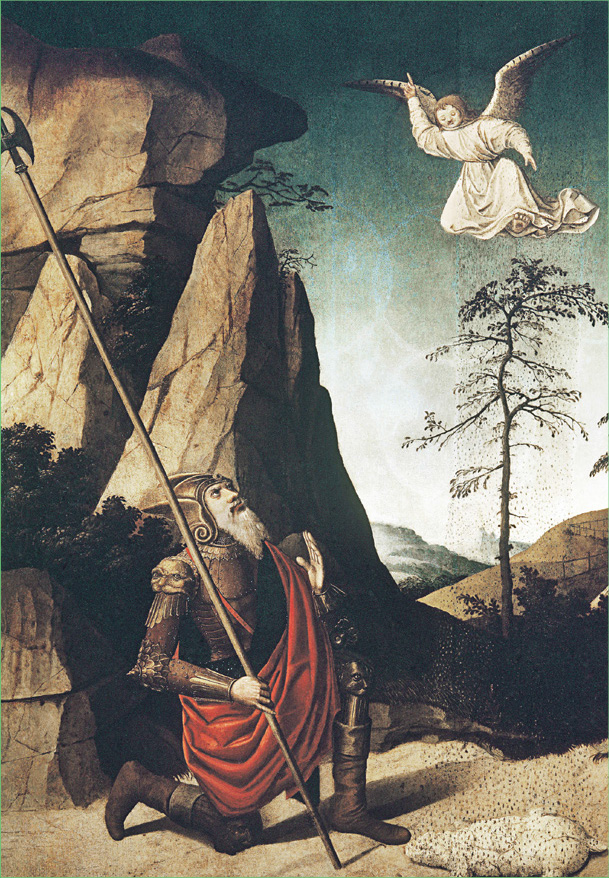
IN BRIEF
Judges 4–8
Deliverance by the judges
13th century BCE During the settlement of Canaan, the Promised Land.
Gideon One of the 12 judges. Chosen by God to help the Israelites seize victory over the Midianites.
Abimelech Gideon’s son who proclaims himself king against God’s will and sets in motion the next cycle of decline for the Israelites.
The Midianites A semi-nomadic people from east of the Jordan, who fight against Israel.
The story of Gideon is typical of the events of the Book of Judges. It follows a familiar cycle of disobedience, punishment, repentance, and deliverance, as the Israelites yet again struggle to remain faithful to their God. Gideon becomes the instrument of God’s intervention, and his miraculous military victory serves to set the people back on the right path, if only temporarily.
Fractious tribes
The Book of Judges began as a cycle of sagas about tribal heroes. These were pulled together into a single book probably in the late 7th century BCE, with additions and revisions made after the fall of Jerusalem in 586 BCE. The book covers the troubled period in Israel’s history between the arrival of the tribes in Canaan between the 14th to 13th century BCE and the establishment of the monarchy in 1050 BCE. Judges depicts the Israelites as living in fractious tribes; it is a messier but almost certainly more accurate picture than the preceding Book of Joshua.
The book proposes to follow the fortunes of 12 judge-deliverers, perhaps to match the 12 tribes. In fact, four of these receive only minimal mention. Along with Gideon, the major stories are those of Deborah and her general Barak, Jephthah, and Samson.
The people suffer
Gideon gets the fullest treatment, his story starting, in a familiar way, with Israel’s disobedience: “Again the Israelites did evil in the eyes of the Lord, and for seven years He gave them into the hands of the Midianites” (Judges 6:1). The effect of the Midianites and their allies the Amalekites is compared to a swarm of locusts in its devastation (Judges 6:5). The land is ravaged and the Israelites are forced to seek refuge in caves and valleys. From a historical perspective, this sounds like a description of the sufferings of settled farmers at the hands of herder overlords who exact brutal harvest-time tributes. The desperate Israelites finally remember God and cry out to Him, but His initial response is to send an anonymous prophet to remind them of His record of saving them and rebuke their ingratitude (6:7–8).
Following this, God (or His angel) appears to a young man, Gideon, who is secretly threshing wheat inside a winepress, hoping to escape the attention of marauding Midianites. The exchange that follows has parallels with the calling of Moses at the burning bush. The angel greets Gideon, perhaps ironically, as a “mighty warrior” (6:12) and tells him that God is with him. However, Gideon’s response is bitter, and he says God appears to have abandoned the Israelites. The angel replies: “Go in the strength you have and save Israel out of Midian’s hand. Am I not sending you?” (6:14). An alarmed Gideon, like Moses before him, protests his weakness and insignificance. The angel simply reasserts that Gideon is the one who is going to strike down the Midianites. As in other Old Testament stories, the divine promise is followed by a sign: the angel touches with the tip of his staff some meat and bread that Gideon has prepared for Him and fire rises from the ground to consume the offerings. Terrified, Gideon realizes that he has been face to face with his true God.
Deborah

As well as being the only female judge, Deborah is the only one shown exercising a judicial role. She lives in the hills of Ephraim by a landmark palm tree, where people come to have their disputes settled. The wife of a man called Lappidoth, she is described as a charismatic prophet.
In her time, Israel suffers under the Canaanite king of Hazor and his general Sisera. When God tells Deborah to call up the army of the general Barak, she rides with it into battle. A sudden rainstorm helps Barak’s army defeat the Canaanites, but Deborah warns that honor of the victory will go to a woman. This becomes true, when Sisera is killed by a woman called Jael with just a tent peg. Judges tells the story of this victory twice, first in prose, then in poetry, in the Song of Deborah. This is believed to be one of the oldest Bible fragments, if not the oldest: a victory song composed possibly as early as the 12th century BCE.

Tackling idolatry
God’s first command to Gideon is to tear down an altar to the Canaanite god Baal that stands on Gideon’s father’s land. He is to build a new altar to God in its place and then sacrifice one of his father’s bulls as a burnt offering. Gideon fulfills this command by night, provoking a furious but ultimately futile backlash from his townspeople the following day.
A more serious challenge comes when a huge army of Midianites and their allies marches across the Jordan and into the Valley of Jezreel. The spirit of God comes upon Gideon, who blows a horn to summon an army from among the tribes of Israel. As the troops begin to rally, Gideon is nervous and seeks reassurance from God.
He takes a woollen fleece and places it on a threshing floor. The next morning, if there is dew only on the fleece and not on the ground around it, he will know that God does indeed intend to save Israel by his hand. As dawn rises the next morning, Gideon wrings a bowlful of water out of the fleece; the ground all around is dry. Still not content, Gideon reverses the test, and when, the following morning, dew is on the ground and not on the fleece, he knows that God is truly with him.

Preparing for battle
Gideon now heads an army of 32,000 men. But this is too many for God, who is determined that Israel should know that He, God, is the one who saves them, not their own military strength. God tells Gideon to ask anyone trembling with fear to quit now. Many men do—22,000 of them—but the fighting force is still too large in God’s eyes. He tells Gideon to cut the forces further.
Gideon takes his army to the waterside. God has told him to note the men who go down on their knees to drink water, and those who stay standing and lap the water up to their mouths with their hands. In the event, most go down on their knees; only a small number use their hands. These few will constitute Gideon’s army—a mere 300 men against a much larger Midianite force. The battle lines are now set. The Midianites are encamped in a valley near Moreh in central Israel. Gideon and his guerrillalike band are stationed on the hillside above.
On the eve of battle, God gives Gideon one last reassurance. During the night, he tells Gideon and his servant to creep down to the Midianite camp and listen to what they hear. Gideon obeys. He hears a Midianite recounting a dream in which a barley cake came rolling down the hill from the Israelite camp and upset a Midianite tent. Another Midianite replies that this must be a sign of the sword of the Israelite leader Gideon and that God has put their fate in Gideon’s hands.
Seeing the low morale of the Midianites, Gideon returns to his men with renewed boldness. “The Lord has given the Midianite camp into your hands” (7:15) he cries, and the men prepare for battle. His tactics are psychological. He divides his men into three groups of a hundred, issuing each of them with a horn or trumpet, an empty jar, and a torch. They are to creep down on the Midianites from three sides, and when Gideon gives the word, they are to blow their trumpets and smash their jars to reveal the blazing torches. At the same time, they will shout: “A sword for the Lord and for Gideon!” (7:20)
The plan works to perfection. The Midianites are caught by surprise and stampede in their panic, turning their swords against each other. The mighty Midianite army flees in confusion and disarray.
“The anger of the Lord burned against Israel … But when they cried out to [Him], He raised up for them a deliverer … who saved them.”
Judges 3:8–9
Role of the judges
The 12 judges were sent by God to deliver his chosen people from oppression. Unlike leaders such as Moses, the judges were intended to provide only temporary leadership, and scholars believe that some of these judges ruled in different regions simultaneously.
Before Israel had kings, the judges were sent by God to act as both prophets and warriors—combining the spirits of both Moses and Joshua. The judges were skilled military leaders: Deborah and her general Barak, for example, led two Israelite tribes to a grand military victory in the late 13th century BCE.
The Book of Judges emphasizes a connection between military and spiritual matters. Without a judge, the Israelites often forgot God’s commands and slipped into sin. He consequently made their enemies strong to punish them. When Israel was led by a judge, however, the people were brought back into God’s service, and able to defeat their oppressors.
The cycle continues
Behind this story lie two key biblical themes: God’s justice and God’s mercy. According to divine justice, disobedience brings punishment. However, divine mercy also ensures that the cry of human suffering reaches God, who intervenes on the part of the supplicant. The benevolent Lord continues to protect His chosen people despite their misdeeds.
God’s deliverance temporarily restores peace and the grateful Israelites ask Gideon to become their king. Although he declines, he still accepts a lion’s share of the gold taken from the Midianites, and uses some of this to make an ephod (thought to be a vestment for covering an idol). Judges records how “Israel prostituted themselves by worshipping it there” (8:27), and idolatrous actions begin yet again.
Despite this lapse, the peace lasts 40 years, until Gideon’s death. It is broken when his son Abimelech does what his father refused to do, by proclaiming himself king. Other judge-deliverers are raised up, but when the people turn against the king, Israel spirals into violence, as Abimelech turns his army against them.

See also: Moses and the Burning Bush • The Fall of Jericho • The Exodus • The Fall of Jerusalem
